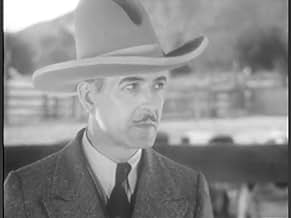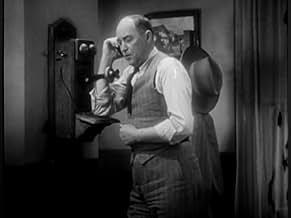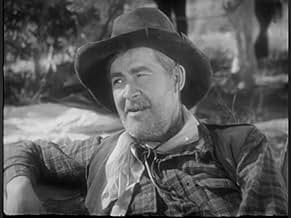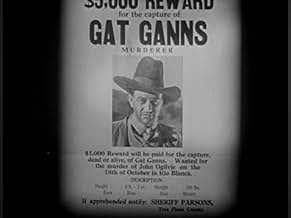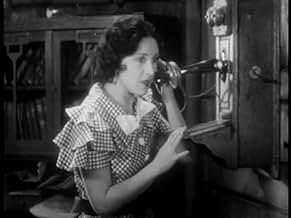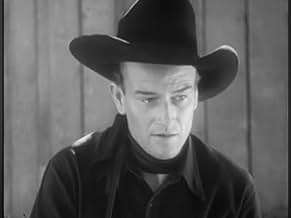Ted Hayden impersonates a wanted man and joins Gentry's gang only to learn later that Gentry was the one who killed his father. He saves Virginia Winters' dad's ranch from Gentry and also re... Read allTed Hayden impersonates a wanted man and joins Gentry's gang only to learn later that Gentry was the one who killed his father. He saves Virginia Winters' dad's ranch from Gentry and also rescues his long-lost brother Spud.Ted Hayden impersonates a wanted man and joins Gentry's gang only to learn later that Gentry was the one who killed his father. He saves Virginia Winters' dad's ranch from Gentry and also rescues his long-lost brother Spud.
- Director
- Writers
- Stars
- Fay Winters
- (as Virginia Faire Brown)
- Dusty Rhodes
- (as George Hayes)
- Mr. Gentry
- (as Loyd Whitlock)
- Spud Hayden
- (as Billie O'Brien)
- Cattle Buyer Hornsby
- (uncredited)
- Doctor Silsby
- (uncredited)
- Henchman
- (uncredited)
- Henchman
- (uncredited)
- Henchman
- (uncredited)
- Henchman
- (uncredited)
- Henchman Butch
- (uncredited)
- Director
- Writers
- All cast & crew
- Production, box office & more at IMDbPro
Featured reviews
film that was important in the development of the "Gabby" (George)
Hayes character who was so enjoyable in the Hopalong Cassidy &
Roy Rogers (& others) films of the 1930s & 1940s. Hayes here
plays a character named "Dusty." He has a scruffy, grizzled look,
but doesn't yet have the beard that came later. Hayes has the
same voice & intonation as he used later, but engages in none of
the comedic antics that where such a big part of his "Gabby"
character. Is it a coincidence that John Wayne rides a white horse,
wears a big 10 gallon black hat & black shirt, & has the same
sidekick as Hopalong Cassidy did, all two years before Hoppy got
started in the movies? The Hopalong Cassidy movie character
seems to bear more resemblance to John Wayne in this movie
than he does to the Hoppy character as portrayed in the Clarence
Mulford books! Blooper: John Wayne's kid brother calls him "Dad"
in one scene! This is an enjoyable film, especially if you like Gabby
Hayes. What ruined it for me was a new soundtrack (basically,
swirling organ music) that was unnecessary & detracted from the
movie. I have the SONY release, copyrighted 1985 by Fox/Lorber,
so beware of that version if you like your old movies to be
unadulterated, as I do.
There's a few good scenes and a decent climax in this entry in Wayne's Lone Star western series but mostly this is middle of the road entertainment with a bit too much talking and not enough action this time around.
However, this does have some better-than-usual acting for the series. Duke and Gabby's performances are also quite likable, as is the actor that played Wayne's young friend.
At one point, Wayne turns to the bad guy and says that he's acting like a character out of a dime novel. He's exactly right. The bad guy and the story are stereotypes even for 1933.
The series seems to move between films that basically follow straight stereotypical Western stories and films that provide funny and clever twists on the stereotypical stories. This one is played straight and thus only has interest for cinema or Western historians. The other type ("Riders of Destiny" and "the Star Packer," for example) are still quite entertaining 75 years later.
Young John Wayne and grizzled George Hayes start with what I learned in college theater-history classes was called a "feather-duster" scene, where characters -- such as a maid, with a feather-duster -- tell the background of the story, today called "the back story."
It's kinda corny, but isn't too damaging.
Probably even in 1934 what was about to happen was predictable, but, before that predictable ending, enough happens in between it should hold the viewer's interest. It held mine.
When the hero meets the leading lady, there is no poor-writing instant romance. In fact, there is no real contact. It's an unusual boy-meets-girl.
That girl is Virginia Faire Brown, who is shown with 74 credits, although she never rose to be a major player and certainly not a star. But she is very attractive, even elegant, with an unusual dark-haired beauty.
Her character's father is played by the veteran Lafe McKee. The sheriff is by that veteran, and very talented actor, who didn't, alas, often enough get to show just how good an actor he was, Earl Dwire.
Chief bad guy is played by "Loyd Whitlock," who is usually known as Lloyd Whitlock, a very busy man with more than 200 credits!
OK, good story, great cast ably performing, lots of riding scenes, and a no-music-track realism that should keep you pinned to your seat. And if you want to see it, there's a good print at YouTube.
The film opens with a piece of good luck coming their way in the person of the dying gunman Gatt Ganns who's been hired by Lloyd Whitlock to kill rancher Lafe McKee. Of course Whitlock is once again a villain in the Snidely Whiplash tradition who not only wants the ranch, but also has evil designs on McKee's daughter Virginia Brown Faire.
In reviewing B westerns, sometimes I have a tendency to reach back to those 19th century morality plays so popular in that era. Whitlock in fact even laughs like a villain in one of those plays. For reference you should see the Irene Dunne-Allan Jones version of Showboat to see just the kind of drama they used to put on then. It survived in the B western, John Wayne's as well as other's.
Wayne of course by the end solves all the problems concerned and the villain gets his just desserts. We can't say how though.
The Duke pretends to be the recently deceased Mr. Ganns to get the goods on the bad guys along with sidekick Gabby Hayes. He discovers a young kid being raised by one of the outlaws. Interesting in this B western set firmly in the 19th century morality play tradition, we also have a topic so very gingerly touched on as child abuse. A rather adult theme for a western or any kind of picture at that time.
Wayne was just beginning his stay at Monogram Pictures Lone Star westerns, this was his third. Monogram had a stock company to rival the much better one of John Ford. Note how for the next three or four years, the casts are just about the same in every Wayne western at that studio. It gets hard to keep these in chronological order, I wouldn't be surprised if a few of these weren't shot simultaneously.
The best you can say about the Monogram films is that they kept John Wayne employed, not something easily said during the Depression. And they beat those serials he did for Mascot. West of the Divide will never be on any John Wayne fans top 10 list.
Did you know
- TriviaIn 1934, this film was condemned by the Catholic Legion of Decency.
- GoofsDuring a fight between Ted Hayden and Butch, Spuds shouts, "Come on, Ted!" Actually, Ted has been introduced to him and all others at the gangsters' hide-out as Gat Ganns. His real identity is in fact revealed later.
- Quotes
Doctor Silsby: You got her here just in time. A small artery's been severed. However, I don't think it's very serious.
- Alternate versionsFox/Lorber Associates, Inc. and Classics Associates, Inc. copyrighted a version in 1985 with a new original score composed and orchestrated by William Barber. It was distributed by Fox/Lorber and ran 48 minutes.
- ConnectionsEdited into Six Gun Theater: West of the Divide (2016)
- How long is West of the Divide?Powered by Alexa
Details
- Runtime54 minutes
- Color
- Sound mix
- Aspect ratio
- 1.37 : 1
Contribute to this page


